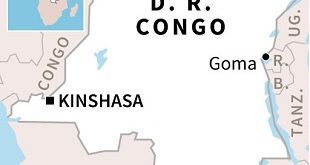Kano, Nigeria | AFP |
The leader of Nigeria’s Ansaru jihadist group, Khalid al-Barnawi, one of three Nigerians listed by Washington in 2012 as “specially designated global terrorists”, has been arrested, an army spokesman told AFP on Sunday.
“Security agents made a breakthrough on Friday in the fight against terrorism by arresting Khalid al-Barnawi, the leader of Ansaru terrorist group in Lokoja,” military spokesman Brigadier General Rabe Abubakar said.
“He is among those on the top of the list of our wanted terrorists,” he added.
Lokoja is the capital of Nigeria’s central Kogi state.
The US Department of State in June 2012 named Khalid al-Barnawi alongside Boko Haram leader Abubakar Shekau and Ansaru founder Abubakar Adam Kambar.
“Shekau is the most visible leader of the Nigeria-based militant group Jama’atu Ahlis Sunna Lidda’awati Wal-Jihad, commonly referred to as Boko Haram. Khalid al-Barnawi and Abubakar Adam Kambar have ties to Boko Haram and have close links to al-Qa’ida in the Islamic Maghreb, a designated Foreign Terrorist Organization,” it said in a statement.
Al-Barnawi assumed the leadership of Ansaru following the death of Kambar in a military raid on his hideout in Kano in March 2012.
Ansaru, a splinter group of Boko Haram, specialising in high profile killings and attacks on global interests, is linked to Al-Qaeda in the Islamic Maghreb.
Al-Barnawi, 47, whose real name is Usman Umar Abubakar, hailed from Biu town in restive northeast Borno state.
He was the alleged mastermind of the March 13, 2011 kidnap of a Briton and an Italian, both construction engineers, in northern Kebbi state.
The two hostages were killed in a failed rescue bid by British and Nigerian Special Forces in the northern city of Sokoto on May 7, 2012.
Trained in Afghanistan and Algeria, he was also behind the January 26, 2012 kidnap of a German construction engineer -– Edgar Raupach — in the northern city of Kano.
The German was killed along with four captors in a botched rescue operation by Nigerian troops on May 30, 2012 at a hideout on the outskirts of Kano, where the group is mostly based.
Ansaru also claimed a 2012 attack on a maximum security facility in Abuja where detained Islamists were being held, killing two policemen and freeing 40 inmates.
With the emergence of Ansaru, Barnawi’s faction became independent of Boko Haram but still maintained ties.
The group also claimed responsibility for the kidnap of a French engineer, Francis Collomp, in northern Katsina state in 2012. He escaped almost a year later.
 The Independent Uganda: You get the Truth we Pay the Price
The Independent Uganda: You get the Truth we Pay the Price


